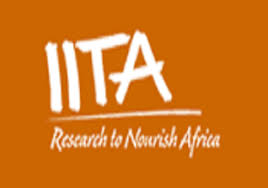The Ibadan, Nigeria-based International Institute of Tropical Agriculture (IITA) is this year’s recipient of the Africa Food Prize. The award is given out by the African Green Revolution in Agriculture (AGRA) and will be announced during the Award Ceremony and Africa Green Revolution Forum (AGRF) Gala Dinner on 7 September in Kigali, Rwanda.
The award recognizes individuals and institutions “leading the effort to change the reality of farming in Africa from a struggle to survive to a business that strives.” The US$100,000-prize “celebrates Africans who are taking control of Africa’s agriculture agenda. It puts a spotlight on bold initiatives and technical innovations that can be replicated across the continent to create a new era of food security and economic opportunity for all Africans,” according to the AGRF website.
Recent awardees include former International Fund for Agricultural Development (IFAD) president Kanayo Nwanze (2016); entrepreneur, founder, and owner of Faso Kaba Sarl Maimouna Sidibe Coulibaly from Mali and academic expert in Food Security and Nutrition Ruth Oniang-o (2017).
The Africa Food Prize began as the Yara Prize, and was established in 2005 by Yara International ASA in Norway to honor achievements in African agriculture. The Yara Prize was moved to Africa in 2016 and renamed the Africa Food Prize.
The award celebrates the achievements of IITA, which celebrated its 50th year of service to African agriculture and smallholder farmers in 2017. The Institute was established in 1967 as the first African link in a network of international agricultural research centers to contribute towards global food and nutrition security. It was created based on the need to have an African version of the Green Revolution that transformed Asia through increased agricultural production in the 1960s.
IITA is supported by numerous donors, governments, and partners, and focuses on increasing food security and availability, enhancing the profitability of foods, feeds, and other agricultural products, and sustainable management of natural resources.
Its research looks at improving crops, making healthy crops, managing natural resources, improving livelihoods, and enhancing nutrition.
IITA has become the largest international agriculture research center in tropical Africa, contributing to food and nutrition security in the region.
As a driver of agricultural transformation in Africa, IITA has developed technologies that include improved and high-yielding varieties of major African staples such as banana/plantain, cassava, cowpea, maize, soybean, and yam; good agronomic and farming practices; seed development technologies; innovative applications for better crop, plant health, and soil resources management. It has contributed to improved overall agricultural productivity in the region, and created wealth for farmers and value chain actors, while making significant contributions to national economic development through agriculture and helping the environment become more resilient.
The impacts of IITA’s work on smallholder farmers, including women and youth, are evident in the adoption of improved varieties of almost 400 cassava varieties with increased yields and better resistance to pests and diseases and environmental stresses; 100+ IITA-bred cowpea materials; 327 maize varieties—70% with IITA germplasm; 78 improved yam varieties; introduction of soybean as food/cash crop in West Africa; adoption of drought-tolerant maize in 13 countries with projected economic gains of US$907 million; introduction of cowpea and soybean for nutrition; nutritional benefits of biofortified yellow cassava and maize; development of Aflasafe™ against aflatoxins and its commercialization in 11 sub-Saharan
African countries is helping trade in groundnuts and maize, and making food supplies safer for
Africans; and support in establishing the commercial seed sector in cassava and yam in West Africa to give smallholder farmers access to good quality and clean seeds.
Growing crops bred by IITA and partners has contributed to 80% of the development impact in sub-Saharan Africa and edible yield increase worth $17 billion. Improved cassava cultivars increased yields by 40%, contributing to the food security of 14 million rural dwellers.
In West Africa alone, economic benefits of using biological control practices developed by IITA against cassava green mite reached a hundred-fold: $100 return for a $1 invested! IITA introduced a natural enemy that reduced the infestation by 90%, benefiting Nigeria, $1.367 billion; Ghana, $305 million, and Benin, $54 million. IITA and sister center CIAT’s work on Africa-wide cassava mealybug control reduced losses by 90% valued at $29 billion in crop recovery.
In Nigeria, IITA has been working with the Federal Government on its agricultural transformation agenda, collaborating with the national agricultural research systems, partners, and various partnership platforms.
IITA’s impact assessment studies in several countries showed that as of 2016; at least 4.3 million people had been lifted out of poverty in sub-Saharan Africa through the adoption of improved agricultural technologies developed by the Institute and its partners.
Send your news, press releases/articles to info@primetimereporters.com. Also, follow us on Twitter @reportersinfo and on Facebook on facebook.com/primetimereporters or call the editor on 07030661526, 08053908817.

